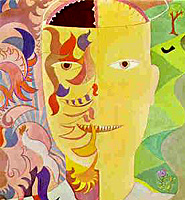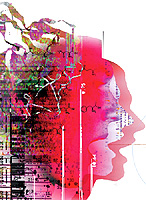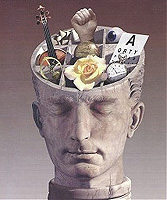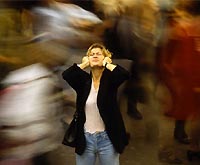Schizophrenia is associated with many prejudices and fears, but with proper treatment with this disease, it is possible to fight quite successfully. What is schizophrenia in fact? As it appears? How it is treated? And what to do if someone from your relatives is sickly schizophrenia?
Content
«It looks like a dream, but it's not a dream, since you do not sleep.
And since you do not sleep, you can't wake up...»
 What do we know about schizophrenia?
What do we know about schizophrenia?
Schizophrenia is a severe and common mental illness. Currently, only in the United States of America, about 2 million people suffer from schizophrenia. But despite the severity of this disease, doctors are able to significantly or at least partially facilitate the suffering of the patient and his loved ones.
Recently, new effective drugs appear, which allow you to significantly relieve life, both the patients themselves and their relatives. With the help of new drugs, you can minimize the need to hospitalize patients with schizophrenia and ensure that their lives will become more independent and productive.
In the absence of treatment, schizophrenia can destroy the life of the patient, his family and even society. Since the schizophrenia is characterized by peculiar changes in personality and behavior, which can take unpleasant and even dangerous forms, society often rejects such patients. And then they suffer from poverty and often do not have a permanent place of residence. In the absence of proper treatment, schizophrenia patients may die as a result of suicide.
What are the symptoms of schizophrenia?
There is no one symptom, which would be typical only for schizophrenia. All the symptoms of this disease can be observed in patients with other mental illness. Separate schizophrenia symptoms can change over time. Many symptoms in women proceed easier.
Violations of perception. The most common sounds, experiences or objects of everyday life can cause inadequate reactions in patients with schizophrenia. The world around the world can scare them. They can be excessively sensitive to objects of a certain form or color, or to noise. Sick sometimes lose the feeling of clear boundaries between self and surrounding them or subjects.
Hallucinations, nonsense, illusions and confusion of mental processes. Usually, schizophrenic patients are experiencing auditory and visual hallucinations, as well as nonsense. The content of delusional ideas may be the most different. The patient can be convinced that he is God, or that he can control the thoughts of others. In patients with schizophrenia, fragmentary or confused and incoherent speech are often observed.
Changed or erased emotions. The reaction of schizophrenia's patient on the surrounding validity often turns out to be inadequate. The patient may laugh, learning about the death of a loved one, or express discontent about the winning of the football team, for which he had earlier. Sometimes schizophrenia is indifferent to everything that happens around. Therefore, it is clear that communication with such patients is often extremely difficult or impossible at all, so they often find themselves in complete isolation
Other changes in behavior. Schizophrenia can manifest itself in the inhibition of movements or repeating monotonous actions and gestures (ritual behavior), for example, walking in a circle. Some patients have a loss of initiative and indecision in decision making. In severe cases, the patient generally loses contact with the surrounding. It can completely stop talking and move, be in a fixed position for a long time.
When diagnosis «schizophrenia», The doctor must eliminate other possible diseases associated with organic brain damage that can manifest similar symptoms. The diagnosis of schizophrenia is raised if the patient has psychotic states for at least 6 months, the loss of the feeling of reality, violations of social contact and thinking, as well as other mental disorders.
Schizophrenia can get sick anyone of any age, even children's. However, approximately 75% of patients with the first symptoms appear between the ages of 16 and 25. People over 40 years of schizophrenia are much less likely, and men are sick more often than women.
Although schizophrenia is clearly connected with hereditary predisposition, for the overwhelming majority of people, the probability of getting sick is still very small. If none of your loved ones never schizophrenia hurt, then in 99 cases out of 100 you also do not get sick. If one of your parents, sister or brother is sick, then the likelihood that you will remain mentally healthy, equal to 90%. Even if both parents are sickly schizophrenia, then with a probability of 60% of their children will not get sick. If the twin is sick, then the likelihood that another twin sick is 30%.
Scientists still do not know the exact causes of this disease, but it is reliably known that the brain of schizophrenia is different from the brain of a mentally healthy person. According to the latest scientific data, schizophrenia is associated with violations of biochemical reactions and some structures of the brain. Schizophrenia - from the same organic brain damage, such as dispelled sclerosis, Parkinsonism or Alzheimer's disease. There are theories explaining schizophrenia as a consequence of a viral infection transferred at an early age, or a minor generic injury of the brain, but they cannot be considered proven.
Although the hereditary factor undoubtedly plays a certain role in the development of schizophrenia, it is not a decisive. Many researchers believe that, as in the case of cardiovascular diseases, cancer, diabetes and other chronic diseases, one can inherit from parents only an increased predisposition to schizophrenia disease, which can only be implemented under certain circumstances.
Symptoms of schizophrenia are amenable to drug treatment. However, as in the case of diabetes, the medicine has not yet been found, allowing to fully heal the disease. At the same time, psychiatry has medicines that allow you to weaken the symptoms at the overwhelming majority of schizophrenia patients.
Medicines used to treat schizophrenia, It is called antipsychotic or neuroleptic means (from these drugs in the treatment of schizophrenia is used haloperidol, trifthazine, ziprex, rispolepta, cyclodol). They suppress hallucinations, nonsense, restore mental processes. Apparently, antipsychotic means adjust disorders of biochemical reactions in brain cells caused by the disease.
Psychosocial rehabilitation. Psychotherapy itself is unable to heal schizophrenia symptoms, but individual and group classes can provide important moral support and create a friendly atmosphere, which is very important both for the patients themselves and for their loved ones. Special studies have been shown that those patients who, in addition to conventional drug therapy, visited a group of psychosocial rehabilitation, tolerated the disease is much easier.
Hospitalization. It is necessary to hospitalize those patients who have an acute form of schizophrenia especially in the initial period of the disease. After the course of effective drug therapy, most of these patients can continue treatment in support groups, rehabilitation centers or outpatients. Most often, repeated recurrences and exacerbations are observed in those patients who independently terminate the reception of drugs Contrary to the recommendations of the doctor.
What is the effectiveness of treatment?
Treatment with modern drug preparations is quite effective at the overwhelming majority of schizophrenia patients, and prospects for the future are pretty encouraging. The newest experimental studies in the field of neurophysiology of the brain and psychopharmacology allow us to hope that drug therapy of schizophrenia will be even more efficient and will help even more patients.
According to statistics, approximately 25% of schizophrenia patients who took antipsychotic drugs regularly for 10 years, became practically healthy. The state of another 25% of patients has improved significantly, and another 25% - moderately. About 15% of patients did not respond to treatment, and 10% died during the specified period, mainly as a result of suicide or accident.
 How to help schizophrenia sick?
How to help schizophrenia sick?
First of all, patient schizophrenia needs an accurate diagnosis, timely and early treatment. In addition, the patient needs sympathy, understanding and respect. As with any other patient, a serious chronic disease, a person suffering from schizophrenia, assistance is needed and support for overcoming fear and isolation caused by not only the disease itself, but also numerous prejudices associated with it.
Since schizophrenia affects many of the functions of the body, the patient often needs physical assistance - ranging from personal hygiene and ending with the choice of the most appropriate diet and control over regular drug intake. Although, with proper and regular treatment, most schizophrenia patients may return to full-fledged life, even in this case they need help in finding work, housing, clothing, financial assistance, etc.D.
How can you help? If you know that the person close to you is schizophrenia, the most important thing you can do for it is to help find effective treatment and insisted that it adheres to this treatment.
How to deal with symptoms? When you come across the symptoms of schizophrenia in a person close to you, you will be much easier to cope with the situation if you learn about the disease as much as possible. Try to understand at least approximately what you have to experience a patient, and why schizophrenia causes an unusual or conflict behavior.
For example, it is very important to understand that nonsense and hallucinations are perceived by patients as real voices, images or events. Do not argue with the patient, laugh at it or seem very concerned. Try to understand what feels the patient, staying calm yourself, and try to calm the patient.
How to cope with the crisis? In some cases, the behavior of patient schizophrenia can be very strange and even dangerous. If you had to face the strange behavior of the patient, then try to keep calm. When communicating with a patient, the tone of your statements should not be condemning, and the statements themselves should be extremely clear and convincing.
Strange behavior is not always dangerous. Even if the patient's behavior becomes threatening, you need to keep calm and clearly imagine the boundaries of permissible abnormalities in behavior. In cases where you see that you are not able to prevent dangerous actions from the patient, you should seek specialized medical care or call the brigade of emergency psychiatric care and as the last measure to cause the police. Your security, the safety of the surrounding and patient should always be supplied to the head of the corner.
What to do if someone from your loved ones schizophrenia?
Schizophrenia is not only a heavy blow for the patient, but also a serious test for his loved ones. Many families try to hide the fact that someone from their relatives suffers from schizophrenia, and try to cope with the disease. As a result, such families remain one on one with a number of problems. If someone from your loved ones is sickly schizophrenia, then you yourself especially need a sense, love and support from the surrounding. You need to understand that, like cancer, diabetes or other chronic disease, schizophrenia is caused by internal processes in the patient's brain, and not your errors in handling it. You can not blame in the occurrence of illness. Remember that you are not alone.
Schizophrenia should not destroy your family. It is impossible to fully immerse yourself in experiences and care associated with a disease of a loved one. Do not forget about your affairs and about rest and do not let the disease absorb you entirely. Scientists believe that new discoveries and new treatments will bring hope for healing many patients. However, try to make the patient's life today was acceptable today, and try to make your own life acceptable.
Since schizophrenia patients often do not understand that they are sick, they are difficult or even impossible to convince the need for treatment. If the patient's condition deteriorates, and you cannot convince nor make it be treated, then you may have to put it in a psychiatric hospital without its consent.
The main goal of both forced hospitalization and laws regulating it is to ensure the safety of the patient in the acute stage, and the people around him. In addition, the tasks of hospitalization also includes the treatment of the patient, even if in addition to his desire. In Russia, the necessary information can be obtained in medical or public organizations of the relevant profile.









